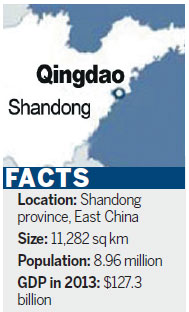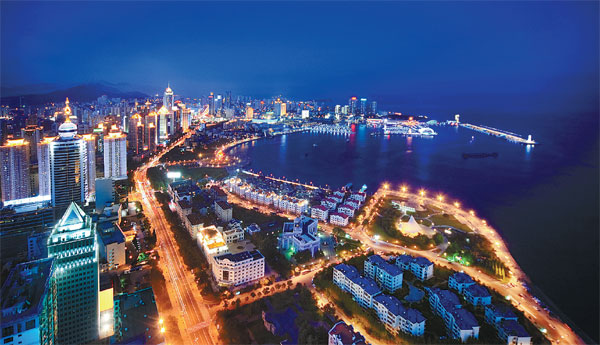City looks to science to boost development
By Xie Chuanjiao ( China Daily )
Updated: 2014-05-18
|
|||||||||

|
Dazzling night view of Qingdao, a coastal city in East China, where local authorities want technological innovation to push for sustainable growth. Photos provided to China Daily |
Authorities in Qingdao, a coastal city and economic hub in Shandong province, expect science and technology to play a more important role in driving local growth, according to the city's science and technology bureau.
In the first quarter of 2014, 583 patents were granted to applicants in Qingdao, and the city topped the province in this indicator for the first time.
Last year, 32,901 patent applications were submitted in the city, with 1,930 granted.
In April, Qingdao Jifa Group invented a high liquid absorption chitosan fiber extracted from shrimp or crab shells. The fiber can be used to produce many surgical materials, including absorbable sutures, and greatly reduces recovery time and minimizes scarring.
Sinder Qingdao, a bio-technology company, recently developed an avian influenza vaccine via cell suspension culture. The vaccine has helped improve the survival rate of broiler feeders by 5.8 percent.
AnyPrint, a company involved in 3D printing, has produced China's first bio-print machine to print heart stents and bone replacements via cooperation with Drexel University in the United States.
In January, Hisense displayed its transparent 3D TV at the 2013 International CES, a consumer electronics trade show in Las Vegas.
Other scientific achievements include technologies in wind turbines, tire manufacturing, agriculture machinery and marine equipment.
As a city known for its marine science development, Qingdao is home to 30 percent of China's oceanographic research institutions.
Revenues generated by ocean-related industries grew by an average of 19 percent in the past three years. The city's marine biomedicine and marine engineering equipment output account for 14.7 percent and 9.5 percent of the nation's total.
The National Deep Sea Base under construction in Qingdao will be the home base for Jiaolong, the cutting-edge submersible that achieved a record dive depth of more than 7,000 meters in 2012.
With a floor space of 150,000 square meters, the lab will be the largest of its kind in China and the second-largest in the world when complete.
The local government has been trying to improve the city's innovative strength by facilitating the transfer of new technologies for commercial use, guiding more funds into R&D and public services.
One such strategy was the establishment of a comprehensive technology market system, which involved research entities, enterprises, intermediary agencies and the government.
The Qingdao Technology Market in the Qingdao High-Tech Zone is the best example of the system. To date, it is home to more than 20 intermediary agencies.

In addition, the city has 45 organizations that offer technology transfer services.
The total value of technology transactions amounted to 3.6 billion yuan ($578 million) last year, up 40 percent.
The city has been actively engaged in facilitation of intellectual property rights protection.
In 2013, police across the city cracked 109 cases of IPR violations, with 144 criminals arrested. The combined value of relative intellectual property was worth 492 million yuan.
An increasing number of IPR-related training workshops are being conducted in the city.
Last year, a total of 7.5 billion yuan was loaned to 68 enterprises as intellectual mortgages by Qingdao-based financial institutions.
The city has also been encouraging the legal trading of intellectual properties and facilitating the development of IPR agencies.
According to the science bureau, the government has waived 1.37 billion yuan of taxes for 640 high-tech companies to date this year.
In addition, the government offered 140 million yuan of financial assistance to support 154 high-tech projects during the same period.
Bureau officials said the government is also improving its service to create a better business environment for high-tech companies.
Efforts include helping enterprises recruit and train talented professionals and enhancing intellectual property rights protection.
xiechuanjiao@chinadaily.com.cn
(China Daily 05/18/2014 page12)





